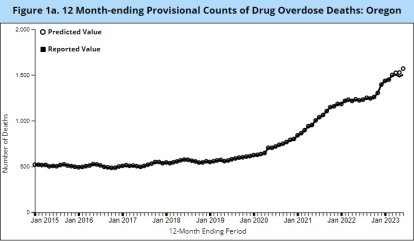The failure of drug decriminalization in Oregon: overdose deaths multiplied 13-fold in three years
Since the implementation of Rule 110, deaths related to opioid consumption have increased from 280 in 2019 to 955 in 2023.

Unas manos quemando hachis con un mechero para hacer un porro.
Three years after decriminalizing the possession of hard drugs, Oregon is more than footing the bill in the death rate related to drug abuse. Compared to 2019, opioid overdose deaths in the state increased 13-fold , nearly seven times the national average. This is an increase from 280 deaths in 2019 to 955 in 2023.
The results of the progressive law, which sought to place more emphasis on the rehabilitation of drug addicts, over criminalizing drug possession, has now led to widespread disapproval among the public. Rule 110 passed with just 58% support from Oregon voters in 2020 and is now open to review by the same Democratic lawmakers who introduced it in the past.

Drug death data in Oregon.
Polls against Rule 110
According to a poll conducted by Emerson College, 56% of Oregon voters now favor repealing Rule 110 entirely. Forty five percent said it should be left as is. In detail, there is a larger majority who believe that the norm should be modified to re-criminalize drug possession, 64%, compared to 36% who believe that the current norm should be maintained as is.
Opinions regarding safety are much more disparate. According to Emerson College, 50% of respondents said they feel that the regulations make their neighborhoods less safe. In the opposite regard, only 20% responded with a contrary feeling and assured that their communities are safer.
Responses that were generally most in favor of Rule 110 were collected in the state's first congressional district, which includes the western half of Oregon City and much of its suburbs. The results in this district for the presidential elections were always in favor of the Democratic candidates. Since 1975, the district's representatives have also always been Democrats.
In the opposite sense, the Oregon district most against Rule 110 is the second congressional district, also the largest in terms of area in the state and mainly rural. The second district, as opposed to the first, has a tendency to vote for the Republican Party in both congressional and presidential elections.
Back to fines and jail sentences
Rule 110 introduced concepts such as providing new, clean injection needles in exchange for used ones for drug users. At the same time, it decriminalized possession for personal consumption. Possession of less than one gram of heroin is only subject to a maximum fine of $100 under this rule.
But even that small fine could be dismissed. The condition for anyone whose amount is seized is to call a telephone line available 24 hours a day and which invites the user to participate in the detoxification program. However, it was not functional. Only 1% of those fined for possession called the helpline.
A panel of Oregon law enforcement workers, appearing before the state Legislature, reinstated drug possession as a class A misdemeanor, punishable by up to a year in jail or a $6,250 fine.
"We don't believe a return to incarceration is the answer, but reinstating a (class A) misdemeanor for possession is vitally important," Jason Edmiston, the small town's police chief, told Oregon lawmakers, rural town of Hermiston, in northeastern Oregon.

























